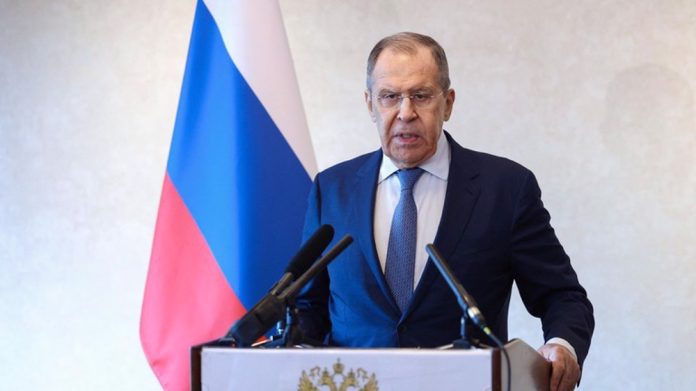The United States has been accused of using a double standard when it comes to overthrowing governments in other nations, according to Sergey Lavrov, the foreign minister of Russia. He added that Washington backs overthrows when they serve its interests but opposes them when they aim to topple “puppet” governments.
In an interview with RT on Monday, Lavrov claimed that the US reaction to the numerous coup attempts that have taken place around the world recently varied and depended on “who was in power and who was trying to carry out the coup.”
“Where the West is content with the current administration, there is no justification for protest in such circumstances. But in instances where the government upholds the interests of the nation rather than the hegemon, we observe that various illegitimate forces are incited [to attack the authorities].”
Lavrov used the conflict that broke out in Yemen a year later and the US’s various methods for bringing about regime change in Ukraine in 2014 as examples.
The alleged Maidan coup in Kyiv, according to the Russian foreign minister, was a “revolt that happened against the legitimate president” and was marred by “bloody provocations against the unarmed police.”
He claimed that despite an agreement on resolving the crisis reached between his government and the opposition just hours earlier and supported by the EU, Ukraine’s democratically elected president Viktor Yanukovich had been forced to flee violence.
But he continued, “Neither the US nor its European allies protested that insurgency. They therefore simply acknowledged it as a zig-zag in the democratic process.”
Lavrov claimed that throughout all of those years, “all our attempts to bring the Ukrainian situation to a political settlement were met with the response [from the Americans and Europeans] that Yanukovich left the country.”
However, when Yemen’s Western-backed president Abdrabbuh Mansur Hadi resigned and “ran to Saudi Arabia” in 2015 due to a political conflict with the Ansarullah resistance movement, Lavrov claimed that “we’ve heard the West saying that he’s still a legitimate president and that he needs to be installed back in Yemen.”. The negotiation process won’t begin until that point.
The top diplomat for Russia also remarked that while the West “doesn’t like the current government” in Georgia, where demonstrations in support of former President Mikhail Saakashvili were fully supported, protests against the “puppet” government of Maria Sandu in Moldova were rejected by the United States and its allies.”
His comments follow an armed uprising by a private Russian military firm.
Alexander Lukashenko, a leader of Belarus, Yevgeny Prigozhin, a representative of Russia, and the Wagner Group’s leader put an end to the brief mutiny by the Wagner Group against the Russian military leadership on Saturday.
Disagreements between Prigozhin and Russian Defense Minister Sergei Shoigu led to the mutiny.
A rocket attack on the group’s field camps in Ukraine, where Russia is engaged in military operations, is alleged to have been ordered by Russia’s military high command, killing “huge numbers” of Prigozhin’s paramilitary forces. Moscow’s authorities, however, vehemently refuted his assertion.
Later, the Kremlin declared that the charges against Prigozhin had been dropped and that the fighters who had taken part in the mutiny would not be prosecuted in honor of their prior service to Russia, however, US denies involvement in mutiny.
Without providing any additional information, Lavrov stated that a Russian investigation is taking place into the possibility that foreign intelligence was involved in the actions of the Wagner Group.
According to what he said, the US ambassador to Russia informed the diplomatic service that Washington was not involved in the mutiny.
“Lynne Tracy, the US ambassador to Russia, was sending signals when she spoke with Russian officials yesterday. Their perception is that the US is not involved in it (the mutiny), but that it does hope that nuclear weapons will be in order and that American diplomats won’t be harmed.”
Tracy, according to him, stressed that Washington views the Wagner Group situation as a “internal affair” for Russia.”
Meanwhile, recent reports indicate that Western nations either directly participated in the mutiny or were aware of the entire Wagner plot beforehand.
Days before ordering his troops to march on Moscow, Prigozhin was “strongly suspected” by US spy agencies to be preparing to engage in military action against Russia, the New York Times reported.
To remain silent regarding Prigozhin’s plans, US officials chose. The excuse given, according to the report, was that if they spoke out, Russian President Vladimir Putin might have accused them of planning a coup.
In the hope that the rebellion would be successful, American intelligence reportedly knew about the impending mutiny for several days but chose not to inform anyone, according to Lavrov.
According to Lavrov, this indicates “what exactly was expected in the West” because another report stated that it “expected” the mutiny to “meet more resistance” and be “much bloodier.”
Furthermore, according to Lavrov, reports claiming that the US has changed its mind about sanctioning the Wagner Group show that Washington’s strategy “depends on what it wants at this specific stage from a certain player.













